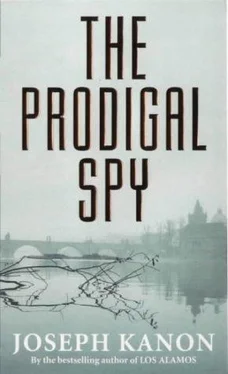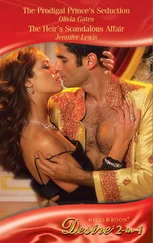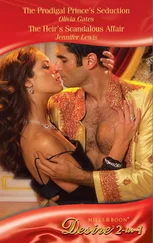“Hey, Nick!”
He turned to the yell and saw the crowd rearrange itself as Henry, from the LSE group, pushed through. He came up to them, clearly excited by the day. “Hi,” he said to the girl. “I see you found him.”
Nick looked at her, puzzled, and saw her face color with embarrassment.
“I thought he’d be over here,” Henry said to her, still unaware of her discomfort. “Description fit?”
“Perfectly,” she said quietly.
“How’d you get lost anyway?” he said to Nick. “Old Wiseman came. He was asking for you.”
But Nick was still staring at the girl. She met his eyes as frankly as before, then shrugged, found out.
“Hey, is that Vanessa Redgrave?” Henry said, looking around. “Where’s Annie? Annie loves her.” He finally made eye contact with his girlfriend and jabbed his finger in the air toward the tall woman.
“I just wanted to meet you, that’s all,” the girl said, still looking at Nick but smiling now. “Is that so terrible?”
Nick didn’t know how to respond. Was she trying to pick him up? Is that the way it worked now? He looked at her, trying to imagine what it would be like. A few light exchanges, the walk back to her flat, the awkwardness until they finally touched-just like that, as easy as the music. In spite of himself, he grinned.
“No. So what do you think?” he said finally, spreading his hands to present himself, making a joke of it.
“I’m not sure yet,” she said, matching his tone. “I like the tie, though. Look, maybe I’d better explain-” But she was drowned by the megaphones starting the demonstration and settled for another helpless shrug of the shoulders and a smile that didn’t explain anything.
The crowd grew quiet around them, alert and solemn, as the speaker welcomed them and asked them to begin the roll call of the dead. They stepped forward one at a time to read the names, the first few barely audible, unsure of the microphones. In the distance they could hear a buzz of traffic, but the square itself had become a hushed theater, and as one name followed another they took on the rhythm of a muffled drum roll.
“Corporal Ronald Stanton. Ben Hoa, 1967. Dead.”
“Private Anthony Moro. Hue, 1968. Dead.”
On and on, all the body bags. The line shuffled forward, holding index cards.
Nick listened for names he might have known, ashamed suddenly of flirting. He could feel her next to him, but she was looking straight ahead, serious, and it occurred to him that he had got it wrong somehow. Not a pickup. Why ask Henry anyway? None of it made sense, except his wanting it to be true, flattered by the attention, as eager as a teenager splashing on aftershave before a dance. “Lieutenant Charles Macomb. Mekong Delta, 1968. Dead.” Not even a town, just a stretch of swamp. At the demonstration in New York they had wanted Nick to wear his uniform. “It’s important, for moral authority,” the organizer had said, a nice kid from Columbia still spotted with acne. But he had refused. Did it make him any better to have been there? It seemed to Nick that he had spent half his life in uniform, being good-Boy Scouts, with the proud sash of merit badges; ROTC, always pressed; the tropical-weight khaki-and it had all come down to a drum roll of names. There was no moral authority in a uniform, not even this new one of beads and headbands. He wondered how many of them had come to a funeral, to read the names, and were thinking instead about getting laid.
“Corporal Leonard Bauer. Lon Sue, 1968. Dead.” Nick looked up, startled. He had been to Lon Sue, before he’d been transferred back from the field, a semicircle of huts and scratching chickens steaming in a hot clearing. But who was Bauer? There’d been a little boy, killed when the bomb he’d been hiding-for whom? — went off, taking a few soldiers with him. Maybe Bauer. Afterward they had shot the parents, who never said a word, grateful perhaps not to have to live through the grieving. The huts were torched. Maybe Bauer had been one of these, shooting flames and yelling, hit later by a sniper. Maybe they were honoring a monster. And maybe he hadn’t been there at all, just a jungle casualty, and someone in the office had looked at a map and picked a place of death for his tag. Now he was another piece of evidence, a name for the Fulbright scholars and draft evaders and movie stars to drop in a box as the line moved on. Who could sort it out? Larry was on his way to Paris to negotiate, which made him the enemy to Miss Redgrave’s friend. And maybe he was.
“You go first,” the girl said, and he saw that they were coming up to the microphones, a few steps above the young faces and careful policemen. He must have been drifting again, because she was looking at him curiously, as if she were trying to read his thoughts. Odd, the dark eyes in the blond face, unless there were hints of green that only showed in the light. He tilted his head a little to see and suddenly wished they could go for a walk in the park, away from the confusion and mixed motives of a rally that wouldn’t matter anyway. A blanket on Hampstead Heath, an afternoon of absolute nothing. Talking idly. The image was so real that he wanted to laugh, surprised to be thinking in song lyrics. Instead he nodded, back in the raw, damp morning, and felt guilty. He was here for the names. He read his card and stepped away from the microphone.
“Private Leonard Prochazka. Hue, 1968. Dead.” She read the name perfectly, so that he wondered whether she had needed his help at all. Or had that been playing up too?
The steady line of readers coming down the steps pushed him farther back into the formless crowd, and for a minute he thought he’d lost her. Then he saw her craning her head near the curb, obviously looking for him, and made his way over.
“Spoken like a native,” he said easily.
“Thanks.”
“Pani Prochazkova would be pleased,” he said, testing her, but her face was blank. “His mother,” he explained.
“Oh.” She looked around at the crowd. “Now what happens?”
“Speeches.”
“Do you want to get some coffee?”
“I can’t. Really. I’m meeting somebody.” He fingered his tie. “Remember?”
“One tie. One meal.” She nodded. “Look, it’s not what you think,” she said, suddenly hesitant.
“It’s not?”
She met his look, debating, then gave it up. “Screw it,” she said. “As if you’d believe me now anyway. Look, I didn’t do this right. I just wanted to see-” She stopped. “One of my bright ideas. Not exactly the best place, though, was it?” she said, extending her hand toward the steps, where the names were still being read. “You probably think-well, I know what you think.”
“Take it easy,” he said, smiling. “Want to start this over?”
She smiled. “I thought you had to go.”
“I do. Can I call you?”
“I don’t want you to think-oh, what’s the difference? You probably wouldn’t call otherwise. Anyway, we can’t talk here.”
He watched her, intrigued, feeling that he was eavesdropping on a conversation she was having with herself. “So can I call you?”
She looked at him again, the same appraising once-over. “Flaxman, double-oh two nine,” she said carefully. “Better write it down.”
“I’ll say it three times. Then it’s mine for life.”
But this seemed to throw her.
“Like the game,” he said. “You know, for new vocabulary words.”
“Does that really work?” she said, genuinely curious.
“Usually. Flaxman, double-oh two nine,” he repeated. “Chisholm, with an l.”
She smiled at him. “Molly. Two l’s,” she said, extending her hand to shake his, just introduced.
“And I’m Nick.” He held her hand for a moment. “I’ll call,” he said, wondering if he would.
Читать дальше












